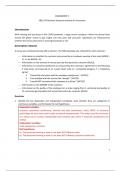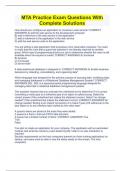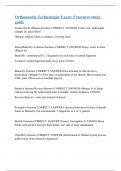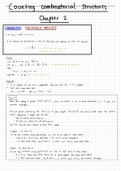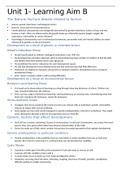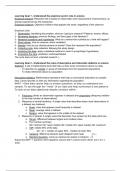Main Takeaways
Deakins ch2
- Intro (governments and policy makers realised the signi cance of
entrepreneurship and small business; EU back to Lisbon strategy; OECD study
SMEs, entrepreneurship and innovation; SMEs and entrepreneurship are widely
recognised)
- De nitions and measurements (di erent ways of de ning small rms, e.g. EU,
UK and US, number of employees & revenue)
- Small rms in the economy (why SMEs matter? e.g. 95-99% of all rms are
small, 60% of total employment and 50% of value added)
- Entrepreneurship and economic growth (positive and negative relationship of
both; entrepreneurship is a consequence, rather than a cause of economic
growth; contribution of small rms to the economy and economic growth, e.g.
reductions in unemployment)
- The changing role of small rms (why small rms became so important now?
shift from large manufacturing rms towards small enterprises occurred in
developed countries; shift from manufacturing to services; advancement of
technology; structural changes in policies)
- Entrepreneurship in emerging economies (shift from socialism to capitalism
«former soviet countries and new members of EU»; factors a ecting high
entrepreneurial activity e.g. regulations, taxations, high foreign direct
investments; Adam Smith’s «peace, easy taxes and tolerable administration of
justice»; open door policy e.g. china and Turkey)
Scarborough ch1
- The role of the entrepreneur (role in the society, downsizing of large rms in US
facilitated some sort of entrepreneurial activity, increase interest in being your
own boss among students, entrepreneurial activity among ppl aged 18-64)
- «Anyone who want to experience the deep, dark canyons of uncertainty and
ambiguity and wants to walk the breathtaking highlands of success»
- What is an entrepreneur (a producer with non xed income and uncertain
returns; entrepreneurs usually start with nothing more than a simple idea and
then nd and organise resources necessary to transform an idea into
sustainable business; are disruptors of traditional way of doing things)
- Table of reasons why entrepreneurs start businesses (men & women by age 20s,
30s, 40+)
- Steve Blank «Entrepreneurial brains are full-time pattern recognisers»
fi fifi fi fi fi ff fi fi fi fi ff fi fi fi
, - Entrepreneurial personality (traits: desire to take responsibility, preference for
moderate risk, con dence in their ability to succeed, self-reliance, perseverance,
desire for immediate feedback, high level of energy, competitiveness, future
orientation, skill at organising, value of achievement over money)
- Space: The next entrepreneurial frontier?
- How to spot entrepreneurial opportunities (monitor trends and exploit them
early; travel and be inspired «Eileen Fisher»; take a di erent approach to an
existing market; put a new twist on an idea; look for creative ways to use
existing resources «dig this»; realise that others have the same problem as you
«mile wise»; take time to play; notice what is missing)
- Bene ts of owning a small business (the opportunity to gain control over your
own future; opportunity to make di erence; opportunity to reach your potential;
opportunity to reap impressive pro ts; opportunity to contribute to the society;
opportunity to do what you enjoy)
- Potential drawbacks of entrepreneurship (uncertainty of income; risk of loosing
your entire invested capital; long hours and hard work; lower quality of life until
biz gets established; high levels of stress; complete responsibility;
discouragement)
Marc Andreessen Interview
- Strong opinions loosely held (things out of consensus, things opposed to the
conventional wisdom, loosely held part «convicted-convicted-convicted-new
facts-change»)
- Course or pivot (pivot -> literally fuck up)
- When they invest (commitment of 10+ years, they don’t invest in other rms
within the same category, their decisions have big consequences for the future
of the rm, stress testing ideas & startups & thinking «argue and counter argue»)
- Book recommendations (the hard thing about hard things, four steps to the
epiphany, high output management «Andy Grove», only the paranoid survive,
zero to one «Peter Teal», Walt Disney biography «Neal Gabler», smart ppl should
build things, my life standing up «quote - be so good that they can’t ignore you»)
- Mid 90s internet (new frontier «concept that goes back to the California gold
rush, simply put it’s when ppl kind of exploit niches to the fullest, so the internet
back in 90s was new virtual frontier but now kind of reached to its potential»,
next frontiers «blockchain and etc»)
- «A dude built his own self-driving car with open source ai database»
- Job creation and job destruction (concerns that ppl gonna lose jobs because of
ai, but the way current economy works e.g. in US every quarter 5 million ppl lose
jobs and 6 millions jobs are created)
fifi fi fi
ff ff fi
, - FOMO (fear of missing out not on things that have not yet happened but on
those that are happening right now and you are not part of it)
- Teaching people (students) how to build things through projects or objectives
- Future of drones
- What advice would you give to Marc the 20 something at Netscape? (the
question I’ll never answer is what would you have done di erently had you
known X, forward like we don’t stop. We don’t slow down. We don’t revisit past
decisions. We don’t second guess)
- Too hungry to eat (when startups lower their prices to get a lot of customers at
the beginning stage and then can’t a ord doing proper sales & marketing)
Edison case
- Invention factory
- Main takeaways
- How did Edison did it with only 3 months of formal education?
- What was his philosophy of innovation?
- What did he learn in the process?
- What was the role of experimentation and prototyping in his laboratories?
- How did he put together his teams? Who was in them? How did he make
the most out of their talents?
- Edison was mainly educated at home by his mother, he found out that book
provide only the theory, but doing the thing itself is what counts; worked night
shifts and studied books during the day
- He failed to sell his ideas (moved to Manhattan from Boston, from political
environment to more nancial)
- Try-fail-learn-try again (he viewed failure as useful part of the process)
- Edison refused to allow conventional wisdom to limit the range of his
experiments
- Edison trusted the problem solving abilities and motivation of his team members
with little to no direction
- For Edison, real world experience counted much more than formal education
(self starters who can handle creative challenges on their own)
- Edison developed a way to test his potential team members (assignments,
sometimes dirty work like lling in the cells of batteries, questions to test their
thinking abilities)
- Edison preferred versatility in his employees rather than specialisation
- After some point, Edison acted as a research director, leaving testing and
experimenting to his subordinates, he answered key questions and checked on
the progress of various inter-related projects
fi fi ff ff

